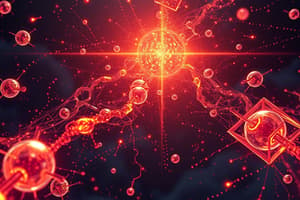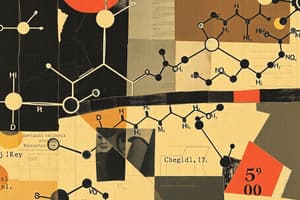Podcast
Questions and Answers
What type of reaction involves the substitution of a halogen onto a benzene ring?
What type of reaction involves the substitution of a halogen onto a benzene ring?
- Addition reaction
- Nucleophilic substitution
- Halogen displacement (correct)
- Elimination reaction
In an elimination-addition reaction, what is typically eliminated in the first step?
In an elimination-addition reaction, what is typically eliminated in the first step?
- Aromatic compound
- Small molecule such as ammonia (correct)
- Hydrogen gas
- Oxygen molecule
What characterizes addition reactions in electrophilic substitution involving benzene?
What characterizes addition reactions in electrophilic substitution involving benzene?
- Formation of an intermediate addition product (correct)
- Involves only alkyl halides
- Rearrangement of benzene ring
- Formation of two separate products
Which of the following is NOT typically involved in electrophilic substitution reactions of benzene?
Which of the following is NOT typically involved in electrophilic substitution reactions of benzene?
What issue could arise from the hand-drawn nature of the chemical structures depicted?
What issue could arise from the hand-drawn nature of the chemical structures depicted?
Flashcards
Electrophilic Substitution
Electrophilic Substitution
A reaction where an electrophile replaces a hydrogen atom on a benzene ring.
Benzene Ring
Benzene Ring
A ring-shaped organic molecule with alternating single and double carbon-carbon bonds.
Halogen Displacement
Halogen Displacement
A substitution reaction where a halogen atom replaces a hydrogen atom on a benzene ring.
Electrophile
Electrophile
Signup and view all the flashcards
Substitution Reaction
Substitution Reaction
Signup and view all the flashcards
Study Notes
Electrophilic Substitution Reactions
- Electrophilic substitution reactions are a type of chemical reaction where an electrophile replaces a functional group in a molecule.
- Halogen displacement: A halogen is added to a molecule and another functional group is removed.
- Addition and elimination occur in halogen displacement
- Example mechanisms are shown for the reactions.
- Aromatic compounds and other organic compounds are involved.
- The reaction products are shown in the diagram.
Studying That Suits You
Use AI to generate personalized quizzes and flashcards to suit your learning preferences.




